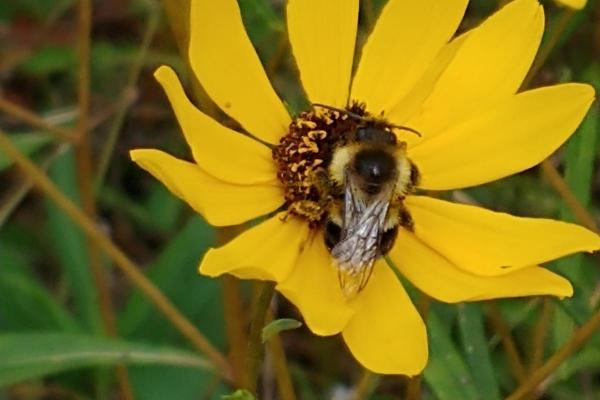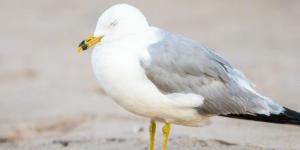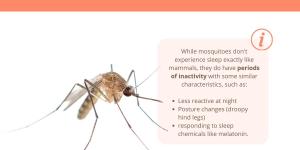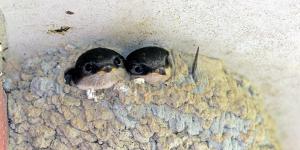Do Insects Sleep? - How and Where Bugs Sleep


Sleep is a state of rest which allows animals to alter various physiological processes. This is necessary to conserve energy, help muscles rest and perform various other functions. Other organic processes change to facilitate this such as altering brain function and slowing respiration. Different animals will require varying amounts of sleep to meet their needs. Some will even sleep for most of the day. You may be aware that there are some insects with adult lifespans shorter than a day. This would imply they don't need any sleep, but this is not the case.
AnimalWised investigates by asking do insects sleep? By discovering how and why different bugs may sleep, we can shed some light on their life cycles and how they manage to conserve energy.
Do all insects sleep?
Insects are invertebrate animals. They are the most diverse group that exists on earth and have a variety of characteristics that give them extremely important biological advantages. As with all other animals, insects do sleep. It is a necessary state of rest in these animals. They need it to rest as with any other animal since all animals will sleep to some degree.
Although all bugs sleep it doesn't mean they will go to bed for 8 hours as does the average human. The sleep cycles of insects will also differ according to their needs. We also need to know that insects have different stages of their life cycles, resulting in different sleep needs. For example, caterpillars are larvae of insects in the order Lepidoptera. They may have different sleep needs to their adult counterparts in butterflies and moths.
Are there insects that do not sleep?
Scientific study in this area has shown that sleep is a part of evolutionary adaptation required for all animals. Not all animals will have the same needs and certain factors will influence how they sleep. For example, dolphins live in water, so parts of their brain will rest even though their body is still moving to keep them afloat. Sleep is an essential physiological requirement for their proper functioning.
Where a bug lives may affect their sleep cycle. Bees and ants both live in colonies. They are highly social animals and live with a well-defined hierarchical and functional structure. If they do not rest or sleep, begin to behave erratically[1]. This can have important consequences for the entire community.
There are other factors which can influence the sleep of insects. As we stated above, bugs may sleep differently during different stages of their life cycle. A species of mayfly known as Dolania americana has an adult-stage lifespan of around 30 minutes during which they mate and lay eggs[2]. However, their nymph forms will complete their life cycle in about a year, during which time they will have rest periods of sleep.
How do insects sleep?
Studying how insects sleep has not been an easy task for scientists. The tiny size of these animals can make study difficult, as can trying to observe them in their natural habitats. For this reason, the functioning of the insect brain in relation to this physiological state is difficult to determine. Details of many insect sleep cycles remain uncertain, but it is very likely that sleep cycles vary between groups.
Despite our relative lack of knowledge, there are some common features in the sleep habits of bugs. They include:
- Open eyes: these tiny animals lack eyelids, so when sleeping, their eyes remain open.
- Antennae: as with other animals, insects relax when they enter the sleep state, something we can see with their antennae drooping.

Where do insects sleep?
Insects are generally fragile animals which are exposed to many predators. They provide an important trophic level in the food webs of ecosystems. In this sense, insects sleep in places where they are safe. Some bugs will have shelter in nests or colonies, whole others can hide in tree trunks, under rocks or in even within different types of vegetation. Although it is difficult to see an insect sleeping, we know that they will likely do it some place where protection is offered.
Different animals have different adaptations when it comes to sleeping habits. Discover some of the most fascinating by looking at our article on animals that sleep standing up.
How much do insects sleep?
We have already commented that the sleep pattern varies from one animal to another. Insects are no exception. While information can be difficult to obtain about how long they sleep, we provide some examples of insect sleep cycles:
- Fruit flies (Drosophila melanogaster): these insects manage to have a relatively deep sleep. They divide these periods of rest between the day when they take a nap and at night when they sleep longer. This means they have a daily total of several hours of sleep.
- Ants (Formicidae): they sleep about 4 hours a day, although they do not do it in a continuous way. They divide it into about 250 naps of very short time, but cumulatively allow them to rest. Learn more about ant behavior with our article on how long ants live.
- Bees (Anthophila): when they are inside the hive, bees take short naps throughout the day. However, when they work outside looking for nectar among the flowers, they work throughout the day and rest with a deep sleep during the night. Bees can fall asleep inside a flower or they can attach themselves with their legs and jaws to a twig of a plant. These insects require sleep as bees carry out very important functions in ecosystems.
- Diurnal butterflies (Rhopalocera): are usually active during the day and sleep at night.
Some insects live in habitats where temperatures can fluctuate significantly. These insects may enter states of torpor as harsh environmental conditions pass, allowing them to survive heat, cold or drought. In these cases, the insects go through a hibernation period where their nervous and respiratory functions decrease.
Other behaviors can affect an insect's sleep pattern. Some humans are somewhat sensitive to coffee as it can alter their sleep rhythm if they drink it at night. There is an insect that is quite tolerant of caffeine, the coffee borer beetle (Hypothenemus hampei ). This insect is a pest of these plants which they destroy by reproducing inside the berries.
Their ability to tolerate high concentrations of coffee is due to enzymes in its digestive system, capable of breaking down this compound without affecting it. So this insect can consume all the coffee they want without any consequences in its sleep cycle.
Learn more about animal sleep cycles with our guide to animals that sleep a lot.
If you want to read similar articles to Do Insects Sleep? - How and Where Bugs Sleep, we recommend you visit our Facts about the animal kingdom category.
1. Doering, G. N., Sheehy, K. A., Lichtenstein, J. L. L., Drawert, B., Petzold, L. R., & Pruitt, J. N. (2019). Sources of intraspecific variation in the collective tempo and synchrony of ant societies. Behavioral ecology: official journal of the International Society for Behavioral Ecology, 30(6), 1682–1690. https://doi.org/10.1093/beheco/arz135
2. Peters, W. L., Peters, J. G. (1977). Adult life and emergence of Dolania americana in northwestern Florida (Ephemeroptera: Behningiidae). Internationale Revue der Gesamten Hydrobiologie und Hydrographie, 62(3), 409–438.
https://onlinelibrary.wiley.com/doi/abs/10.1002/iroh.1977.3510620306
- Castillo Arias, M. (2022). Beekeeping Health Manual (1st ed.). Spain, Guadalajara: Ecocolmena. Beekeeping teacher and community manager. Retrieved from: https://www.ecocolmena.org/como-duermen-las-abejas-meliferas-y-silvestres/






